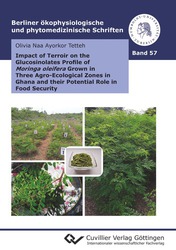| Departments | |
|---|---|
| Book Series (96) |
1381
|
| Nachhaltigkeit |
3
|
| Gesundheitswesen |
1
|
| Humanities |
2370
|
| Natural Sciences |
5408
|
| Mathematics | 229 |
| Informatics | 319 |
| Physics | 980 |
| Chemistry | 1364 |
| Geosciences | 131 |
| Human medicine | 243 |
| Stomatology | 10 |
| Veterinary medicine | 108 |
| Pharmacy | 147 |
| Biology | 835 |
| Biochemistry, molecular biology, gene technology | 121 |
| Biophysics | 25 |
| Domestic and nutritional science | 45 |
| Agricultural science | 1005 |
| Forest science | 201 |
| Horticultural science | 20 |
| Environmental research, ecology and landscape conservation | 148 |
| Engineering |
1795
|
| Common |
98
|
|
Leitlinien Unfallchirurgie
5. Auflage bestellen |
|
Advanced Search
Impact of Terroir on the Glucosinolates Profile of Moringa oleifera Grown in Three Agro-Ecological Zones in Ghana and their Potential Role in Food Security (Volume 57) (English shop)
Olivia Naa Ayorkor Tetteh (Author)Preview
Extract, PDF (310 KB)
Table of Contents, PDF (200 KB)
Moringa oleifera Lam. can survive extreme growth conditions by adjusting its metabolism. Among the potential metabolites produced during adaptation are glucosinolates, which possess potential cancer chemoprotective attributes.
Recent climate events, such as increased temperatures and prolonged drought, impact crop yield and quality significantly. Therefore, climate-resilient plants such as M. oleifera can be utilized in areas where crop production is adversely affected.
Understanding how terroir factors and cultural practices affect the glucosinolate profile in M. oleifera is important for optimizing cultivation strategies. To achieve this, the leaves from cultivated and wild-grown mature M. oleifera plants were harvested for intact glucosinolates analysis. Prior to the analysis, preserving the plant materials to prevent the breakdown of glucosinolates was important. Given that the use of dehydration methods such as freeze drying for the leaves is expensive and laborious in developing countries like Ghana, a locally well-suited dehydration method, namely oven-drying at 40 °C for 48 h, was identified and utilized.
Results showed that during the rainy season, climate parameters did not significantly influence the total glucosinolates content in all leaf materials harvested. In contrast, accession selection, harvest time, and agro-ecological zones significantly influenced the total glucosinolate content. Fertilization significantly altered the vegetative growth parameters of the cultivated accessions, but not the total glucosinolates content.
In conclusion, M. oleifera proved to be well adapted to the climate in Ghana. The continued collection, storage, and use of the genetic resources of M. oleifera accessions well-adapted to stress conditions are envisaged to ensure the species‘ contribution towards improved food security and nutrition among vulnerable groups.
| ISBN-13 (Hard Copy) | 9783736979772 |
| ISBN-13 (eBook) | 9783736969773 |
| Final Book Format | A5 |
| Language | English |
| Page Number | 192 |
| Lamination of Cover | matt |
| Edition | 1 |
| Book Series | Berliner ökophysiologische und phytomedizinische Schriften |
| Volume | 57 |
| Publication Place | Göttingen |
| Place of Dissertation | Universität Berlin |
| Publication Date | 2024-03-28 |
| General Categorization | Dissertation |
| Departments |
Analytical chemistry
Biology Agricultural science |
| Keywords | Glucosinolate, Ernteverfahren, Trocknungsmethoden, Mikronährstofferhebung, micronutrient survey, glucosinolates, harvest techniques, drying methods, agro-ecological zones, climate, soil, elevation, fertilization, accession, harvest time, micronutreint deficiency, agrarökologische Zonen, Klima, Boden, Höhenlage, Düngung, Anbau, Erntezeit, Mikronährstoffmangel, Internationale Agentur für Krebsforschung, International Agency for Research on Cancer, Hochleistungsflüssigkeitschromatographie, High Performance Liquid Chromatography |








